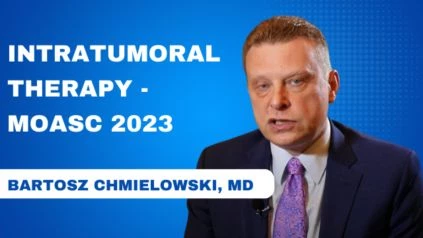By. Bartosz Chmielowski, MD PhD
Date: 11/22/2023
In this presentation, Bartosz Chmielowski, MD PhD, discusses advancements in cancer therapy, focusing on approaches utilizing herpes virus-based treatments. The spotlight is on T VEC, the pioneering herpes virus therapy for cancer patients. The approval of this therapy was based on the durability of responses observed during clinical trials, demonstrating a heightened response rate compared to G-M-C-S-F injections alone.
Bartosz Chmielowski, MD PhD, emphasizes the specificity of T VEC, clarifying that it is tailored for patients with easily injectable diseases, limited to skin lesions or palpable lymph nodes. The therapy showcased a borderline improvement in overall survival, especially crucial at a time when large PD-1 blocking antibody results were not yet available.
The discussion then shifts to the combination therapy involving RP1, Fusolimod, and parapoxvirus, combined with nivolumab. Bartosz Chmielowski, MD PhD, details an overall objective response rate of 37.4%, offering hope for patients with primary and secondary resistance to anti-PD-1 therapy. This new herpes-based virus is anticipated to enhance infectivity in cancer cells and improve antigen presentation, presenting a potential option for patients progressing on PD-1 blocking antibodies.
The dialogue delves into intralesional therapy with cytokines, specifically IL-12 (tavokinogene telsaplasmid). Bartosz Chmielowski, MD PhD, notes the challenges faced with systemic IL-12 administration due to significant side effects, leading to the development of electroporation methods. While initial trials displayed promise, subsequent confirmatory trials, particularly in combination with pembrolizumab, yielded less favorable results. Despite setbacks, ongoing efforts explore alternative delivery methods for IL-12.
The conversation evolves to address the need for personalized treatment in PD-1 progressors and the scarcity of biopsies to validate activity and establish biomarkers. Bartosz Chmielowski, MD PhD, advocates for smaller, lab-focused trials, emphasizing the importance of linking clinical observations with laboratory analyses. The heterogeneity of resistance mechanisms prompts a call for tailored therapies based on individual patient profiles.
The presentation concludes with a discussion on innate immune agonists like Vigitalimod, CMP001, and Tilsitolimod (IMO2125). Bartosz Chmielowski, MD PhD, expresses interest in these therapies’ potential to activate dendritic cells, enhancing antigen presentation and immune response. However, the need for confirmatory randomized trials remains paramount to validate and translate these responses into clinical outcomes.
In summary, Bartosz Chmielowski, MD PhD, offers an overview of the evolving landscape of herpes virus-based therapies, emphasizing the need for personalized treatments and ongoing research to address challenges in cancer therapy.

